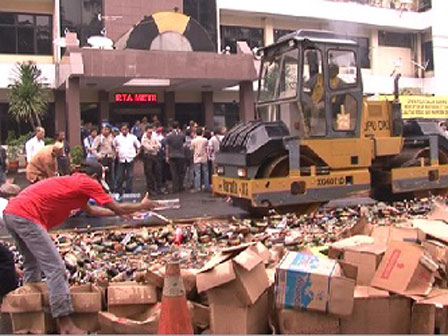Police Raided Illegal Used Oil Factory, 190,000 Liters Seized
Reported by Budhi Firmansyah Surapati | Translated by Nugroho Adibrata
The apparatus of Directorate of Special Detective and Criminal for City Police raided a factory that manages the hazardous and toxic waste (B3) type used oil at RT 05/03, Marunda Urban Village, Cilincing, North Jakarta, Tuesday (8/19).
All this time, they are accommodating, processing, and selling used oil without permission. In one month, they can gain profit amounting to Rp 250 million
Based on the raid results, the police have confiscated nine storage tanks with a capacity of 16,000 liters, 11 containers with a capacity of 48,000 liters, four pump machines, one truck, 25 drums, 190,000 liters of toxic used oil.
Police Raided Shop-house in Gambir, 90 Kgs Meth ConfiscatedChief of Public Relation Section for City Police, Sr. Comr. Rikwanto explained the factory as wide as one hectare is managed by five companies since 8-12 months ago. Those are PT HB managed by MB, PT PM by AB a.k.a WW, PT GB by P, PT BS by AS, and PT JY by S.
"All this time, they are accommodating, processing, and selling used oil without permission. In one month, they can gain profit amounting to Rp 250 million," he told.
He explained that the chronology started when officers were receiving an illegal activity information from locals over the storage of B3 waste type used oil. They then immediately follow up it by montoring the activity.
At the scene, police found five companies that manage used oil. These companies produce oil from B3 waste and then sold it to factories for industrial fuel.
According to him, the offenders have violated the Article 102 and 109 of Law No. 32/2009 on Environmental Management, with imprisonment at least 1-3 years or pay a fine of Rp 1-3 billion.
Head of North Jakarta Environmental Office, Mudarisin explained B3 waste is hazardous substance and toxic to biotic including humans.
"The B3 waste is flammable and explosive. It's one of the non-specific sources. People must have permission first if they want to produce it, ranging from storing, transporting, managing, and utilizing. Its permission is at the national level," he exclaimed.



